As an athlete, one of the greatest career accomplishments is being able to play professionally at the highest level in the world. For New York Rangers defenseman Brady Skjei, fulfilling his childhood dream of playing in the NHL has been something that is indescribable.
Skjei grew up in Lakeville, Minnesota, a rural city south of Minneapolis. He spent his youth playing hockey, football and golf alongside his best friends and eventually attended Lakeville North High School in 2008. After two successful seasons with the Lakeville North Panthers, he was faced with one of the most difficult decisions of his life. Leave his family and friends behind in the town he spent the last 16 years in or move to a new state with the hopes of furthering his hockey career?
I was fortunate enough to sit down with the 2016-17 First Team All-Rookie selection and discuss his career path that led him to the Big Apple.
Q&A with Brady Skjei
Evan Peterson: What was it like playing high school hockey in Minnesota?
Brady Skjei: It was unbelievable; I couldn’t imagine growing up in a different state. The city I grew up in (Lakeville, MN) had a great group of seven guys. We just really enjoyed the sport of hockey and we all had a passion for the game. We used to all go out to the outdoor rinks every winter and play pond hockey, which is a big part of the culture in Minnesota. I couldn’t have asked for a better place to grow up.
Peterson: What was your most memorable moment playing for Lakeville North High School?
Skjei: For sure the [Minnesota] State Hockey Tournament. We made the tourney my sophomore year, but unfortunately we lost to Minnetonka in the first round (Skjei had North’s only goal in a 6-1 loss). Just getting the opportunity to play in the tournament that I grew up going to and being able to play in front of 18,000 fans was something that I will never forget.
Peterson: In the Summer of 2010 you were selected to join the United States National Development Program (USNTDP) in Ann Arbor, Michigan. After two successful seasons at Lakeville North, how difficult was the decision to leave for the USNTDP?
Skjei: It was very difficult. After my sophomore season I knew that I had an opportunity to play for Team USA. When I was officially selected to go to Ann Arbor I sat down with my parents and discussed the opportunity at hand. It was a difficult decision and I had to give up a lot of things such as leaving the town I grew up in, my family, my buddies, and quitting competitive football and golf. However, at the time I thought it was the best possible option to achieve my lifelong goal of playing in the NHL. It was difficult, but I was very fortunate to live with an amazing billet family, and they made the transition to Michigan a lot easier. Obviously it was hard to leave the place I grew up for the past 16 years behind, but it all worked out in the long run and I am glad that I did it.
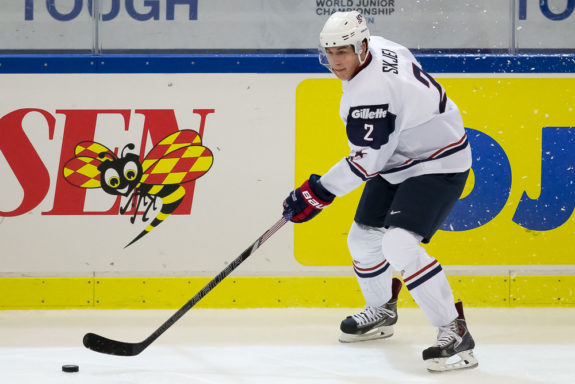
Peterson: How close were you to turning down the offer?
Skjei: I think I was all in, especially after making it to the (Minnesota) State Hockey Tournament. That was my biggest goal while playing high school hockey, and maybe if that did not happen, who knows? But it definitely made my decision to join the [USNTDP] development program a lot easier.
Peterson: How did your game transition in Ann Arbor?
Skjei: Going into my first season I was definitely more of an offensive-defenseman. I think I had the skill going in there [USNTDP] to continue to be an offensive-styled player, but once I got there I really learned how to defend and play in my own zone, while also using my stick to break up more plays. That really helped me to become a two-way defenseman and I believe that if I would have stayed for another year or two at the high school level I would not have been challenged like I was playing against older competition in the USHL and international tournaments. The biggest thing was learning how to play defense and adding to the offensive side of the game.
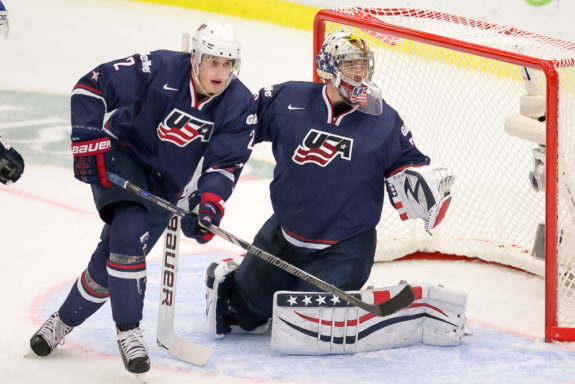
Peterson: What was it like representing your country on an international stage?
Skjei: When you put on the USA jersey for the first time, I mean it’s so cliché, but it’s an unbelievable feeling and you can’t even put it into words. I remember the first time I wore the jersey we were playing in our first event in Chicago and it was amazing skating around in warm-ups and seeing our entire team in the red, white and blue. Also, getting the opportunities to play at the World Juniors and World Championships is something that you can never take for granted and it was truly an amazing honor. You’re representing something bigger than yourself.
Peterson: What were your feelings and emotions like after hearing the Rangers call your name on draft day in 2012?
Skjei: It was an unbelievable feeling. Being drafted was another goal and dream that I had growing up, and to be picked in the first-round [28th overall] by the New York Rangers was unbelievable. Having my friends and family in the crowd to share the moment with was awesome and I couldn’t have picked a better team to go to. I was projected to go a little higher, but when I started falling and saw the Rangers were within range at number 28 I just wanted to fall a little further and end up there. It all worked out. Being drafted was an unbelievable feeling, and I was able to meet the management along with other players on the team. The whole event was special and one of the greatest days of my life.
Peterson: After two successful years in Ann Arbor, what was the transition like to college hockey at the University of Minnesota?
Skjei: The first year was actually tough. I came into a situation where the previous team was a Frozen Four finalist (NCAA) and they only lost two or three guys from that roster. I had to earn my stripes and figure out the game, but after that, I was able to settle in more comfortably. My sophomore and junior years I made strides and was used as more of a shutdown defenseman, which translated well for my game in the NHL. In order to make it in the league you need to know how to defend; it doesn’t matter if you’re the best offensive guy—you need to know how to play defense.
Peterson: Was it an easy decision to leave the Gophers after your junior year and sign pro?
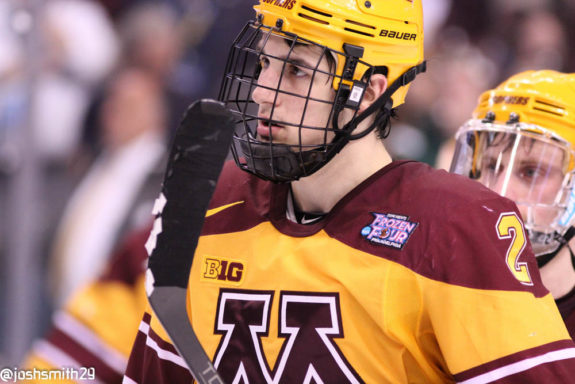
Skjei: No. It was another tough decision and I think that when my junior season came to a close I just felt that it was the right time. The Rangers were also on board and felt that it was the right time to sign as well. Once again, it was tough to leave my college teammates, but moving on and playing those last few playoff games in Hartford was a great step for me to learn the pro game and head into camp in the fall with some added experience.
Peterson: During another developmental year with Hartford in the AHL, the Rangers called you up to make your NHL debut on Dec. 15, 2015, at Madison Square Garden against the Edmonton Oilers. What was the feeling like when you received the phone call?
Skjei: It was another amazing moment that I will always remember. I was sitting in my room in Hartford and the phone rang and it was my d-coach, Jeff Beukeboom. He said that I was getting called up. I left in a car service that night to head to New York and we played the very next day against Edmonton. My parents flew out for my debut and it was truly another incredible experience.
Peterson: Two nights later you came home to St. Paul for your second career game against the Minnesota Wild. How surreal was it to have your homecoming in just your second career NHL game?
Skjei: It came full circle for me really fast. I was able to get the first-game jitters out the night before against Edmonton, but coming back home to play the Wild in front of all my friends and family, I definitely had the jitters again. It was just pretty ironic how it worked out, and it was another special moment for me in my career. My camp had about 50-60 people in the crowd, and seeing them all after the game was really cool.
Peterson: After being sent back down to Hartford near the tail end of December 2015, New York re-called you for the final games leading up to the 2016 postseason. What was it like playing your first NHL playoff series against Sidney Crosby and the Pittsburgh Penguins?
Skjei: Again, everything just happened so fast. I played the last five games with the Rangers before the start of the playoffs and I was very excited. Surprisingly, I wasn’t nervous and felt I was playing loose. To play against [Sidney] Crosby and [Evgeni] Malkin the first series was eye-opening to say the least. These were some of the guys I looked up to and watched growing up, so to be able to play on the same ice sheet against them was really special. I felt that I played pretty decent, but unfortunately the outcome did not go as planned. Overall, I think it helped solidify my spot on the team the following year [2016-17], and I gained some much-needed experience going forward.
Peterson: What was it like scoring your first career goal against the New Jersey Devils?
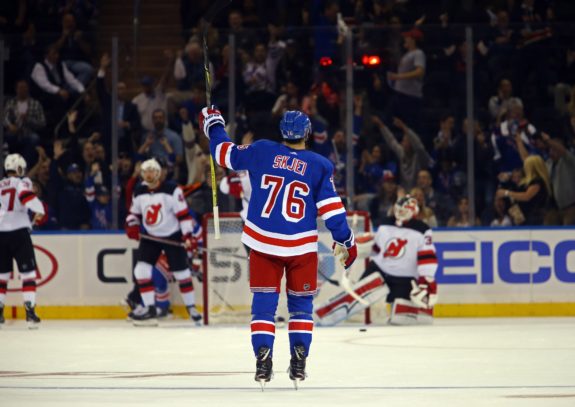
Skjei: It was awesome. It took a bit of time for me to find the back of the net. I think it was mid-December [Dec. 11, 2016] when I scored. I remember the play like it was yesterday; the puck got won back off of a faceoff to [Derek] Stepan, and he one-touched it to me from the boards. I took a one-timer from the point that went off of a Devils player on its way to the net and went in. It was an amazing feeling, and my momentum carried me right towards our own bench where all of the guys were going nuts. It was just awesome to be able to get your first one and it finally got the monkey off my back for the remainder of the season.
Peterson: A few nights later you had a near-life threatening injury scare against the Chicago Blackhawks in which you were featured in an ESPN article the following month. How did the fluke-like experience take place and how lucky were you to be able to walk away healthy?
Skjei: It happened so fast. It was a defensive-zone draw and Marian Hossa cut back on Kevin Hayes. Hayes’ leg got kicked up somehow and his skate blade sliced me right in the chin. Looking back, I was so lucky that it wasn’t another inch lower around the neck area. I left the game briefly and received over 30 stitches and lost two teeth. The doctors and the Rangers organization did an amazing job. I was able to return to the game in the third period after being all numbed up. It wasn’t too heroic, but it was a scary moment that I look back on and realize just how lucky I was.
Peterson: What was the transition like living in NYC as opposed to growing up in rural Lakeville, MN?
Skjei: It was a huge change for sure. I think it’s nice right now because I have the best of both worlds. Nine months out of the year I get to live in the best city in the world (NYC), with the most amazing food and social setting. The best thing is our fan base and how much these die-hard fans enjoy the Rangers. It’s a little slower in Minnesota, but I get to spend my other three summer months out on the lakes and play golf with my buddies I grew up with. I truly get the best of both worlds.
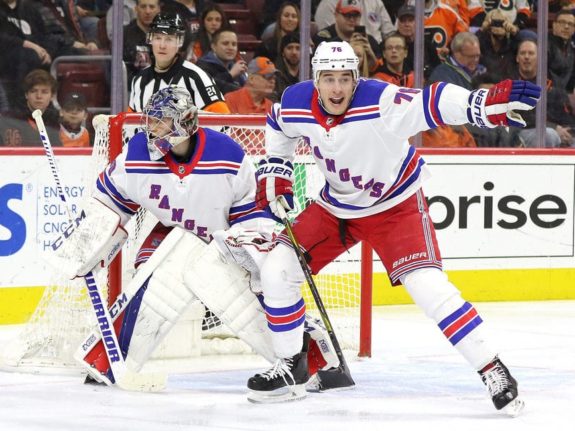
Peterson: After a successful first full season with New York in 2016-17, the Rangers suffered a setback in 2017-18. Where do you feel the direction of the franchise is heading now?
Skjei: This last year was obviously very tough for us. We lost a lot of older, veteran guys, and as they say, it is kind of a rebuild now. But I like the direction of this team as we have a lot of younger, skilled players. We now have three 2018 first-rounders and a new coach, David Quinn. Quinn is a former Boston University guy and is good with younger players. He has coached in the pro hockey level so it is going to be an exciting time to be a Rangers fan. I think we are going to be a young, fast-paced team with a lot of skill. We won’t have much to lose so we will be hungrier than ever. It’s going to be a great year for sure.
Peterson: You have been a leader at essentially every level that you have played at; do you see yourself being a captain for New York in the near future?
Skjei: Obviously I would love to be a captain and it would be a huge honor. This past season with all of the ups, downs and trades, I was put in more of a leadership role with younger players being called up, especially with the younger defensemen. Even though it is still pretty early in my career I feel that with my leadership role last year and my previous experience it would be a tremendous honor to wear a letter for the Rangers.
From Minneapolis to Broadway, Skjei’s dedication to the game has taken him to new heights that he hopes will continue in New York for many years to come. He is currently a restricted free agent and is hopeful of reaching a new, long-term contract with the Rangers this summer.